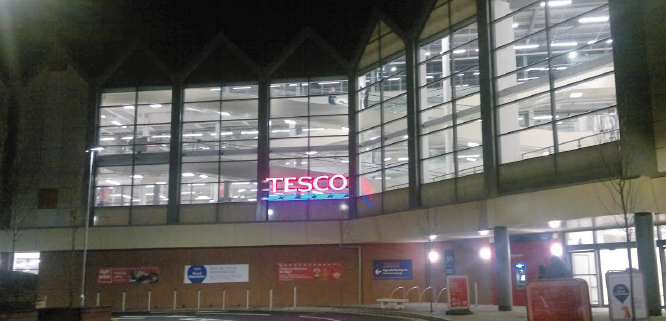 AN ABERYSTWYTH woman has started a petition to get the new Tesco store in Aberystwyth to turn its lights out. Alexandra Parr asks: “Why does a small town need to be illuminated day and night by a big new Tesco shop and car park in the town centre, very close to residential areas?”
AN ABERYSTWYTH woman has started a petition to get the new Tesco store in Aberystwyth to turn its lights out. Alexandra Parr asks: “Why does a small town need to be illuminated day and night by a big new Tesco shop and car park in the town centre, very close to residential areas?”
Stating that Tesco’s lighting is a waste of energy, Alexandra Parr also says that the supermarket is causing light pollution: “It just makes no sense to have these big lights on an open topped car park on in daylight, and then continue to be on all night when the shop is not open.” For the residents who live on ground-floor level near to the car park, she says ‘it is like daylight shining into their windows’.
“Tesco have gone ahead with this massive illumination with no thought for the residents of the town, the planet’s resources, and it doesn’t seem much thought at all.’
As of Wednesday (Dec 14), the petition had gathered 443 signatures. When complete, Alexandra Parr intends to deliver the petition to both Tesco Head Office and Ceredigion County Council. A regular visitor to Aberystwyth who lives in Bath
commented on the petition online: “I have been horrified that in this environmentally aware age that TESCO firstly, want to and second ly, that the Local Authority has allowed the indiscriminate floodlighting that now dominates the whole vista of the town from near or far. By the proper placement of the appropriate lighting fixtures, and by selective ‘as necessary’ switching all TESCO-specific requirements can be easily satisfied without having to detrimentally affect the Welsh environment, and at the same time annoy the town’s residents nearby and everywhere else within line-of-sight.”
Switch-off switches!
Independent experts on carbon emissions, The Carbon Trust, state that, on average in the retail sector, 25% of an organisation’s electricity costs come from lighting. In 2013, France passed a law on the lighting of non-residential buildings that required shops and offices to turn off their lights one hour after the last worker leaves a building. Shop window displays should be turned off at 1am and shop windows may only be lit from 7 am or an hour before opening time. Back in 2013, experts calculated that if the UK adopted a similar law, it could save almost £1.20 billion per year. In terms of light pollution, the International Dark- Sky Association cites research which suggests that artificial light at night can negatively affect human health in a number of serious ways. Moreover, they point out that glare from bad lighting is a safety hazard. Glare decreases vision by reducing contrast, which limits our ability to see potential dangers at night. This is particularly the case for older people.
Tesco’s environmental policy states that: “Following the UK’s 2010 Climate Change Act, we made an ambitious commitment to become a zero carbon business by 2050 and have set medium-term 2020 targets to help us achieve this, specifically: To reduce CO2e emissions per square foot of our stores and distribution centres against a 2006/7 baseline by 50%.” So, by any measure, including their own, it seems that Tesco should consider switching off at least some of the shop and car-park lights to save their neighbours grief, save themselves a lot of money, and save a bit of carbon from entering the atmosphere and contributing to climate change: Every little helps! Now, who said that?















Add Comment